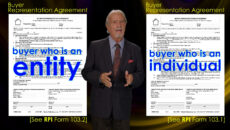How many of your listings expire each year, resulting in no fee?
- Fewer than five. (71%, 30 Votes)
- Five to ten. (14%, 6 Votes)
- More than ten. (14%, 6 Votes)
Total Voters: 42
The year: 2014.
The location: Southern California.
Our protagonist: Sam, a licensed real estate agent.
Sam has been a licensed real estate agent in California for 15 years. He works at a small brokerage in Pomona and typically closes around 20 home sales a year. Almost all of these homes are in the low-tier, usually selling for $200,000-300,000.
The standard fee Sam receives on each of these transactions is 2.5-3% of the purchase price, which he splits with his employing broker. This comes to about $5,000 per home sale he closes.
This has worked for Sam and his family for the past 15 years. However, 2014 is different. More and more of his clients are backing out in the middle of the deal. Despite Sam’s warnings that prices were slipping after over a year of rising prices in 2012-2013, his seller clients stubbornly insist on their unrealistic sticky price expectations.
Even when they were willing to sell at market prices, they find they’re not able to qualify for a loan big enough to upgrade to a bigger property. So they choose to let their listings expire, leaving Sam with empty pockets for his many hours of work.
Sam consoles himself by thinking: This is just something real estate agents experience. I’ll make it up on the next deal.
But then it began happening again — Sam remembered the couple he’d taken to dozens of showings and spent hours counseling on the phone. He’d even helped them prepare a balance sheet – but in the end, they chose to continue renting.
Their reason: they decided to look for a home back in early 2013 when mortgage rates were enticingly low. But with rising mortgage rates, the buyers qualified for less mortgage money — and less house. With reduced purchasing power staring them in the face and prices rising, they decided to push off homeownership and continue renting.
All those hours wasted, and absolutely no fee to show for it. Sam felt like he was gambling in a casino.
Sam searches for help
But Sam wasn’t ready to throw in the towel. He had a friend doing well as an agent in nearby Pasadena. He called his friend up and she explained her strategy:
“It’s simple, Sam. If you only work in high-tier home sales, then you don’t have to close as many deals! I mean, look at me: I close half as many deals as you do each year, but I make the same amount of money!”
Sam sighed. He had been building his FARM for years. To switch neighborhoods now and build a new sphere of influence had the potential to be disastrous for his finances. But he hadn’t closed a sale in months, and he was getting desperate.
He called up his brother, who was a car salesman. His brother laughed at his predicament:
“Sam, you must not be doing it right! Selling homes is the same as selling cars. If you push the customer enough and get them to agree to buy more, more, more — and quickly — then you get the commission!”
But Sam’s good reputation as a real estate agent was built on trust between him and his clients. He wasn’t going to betray the fiduciary relationship with his buyers or sellers. What was he going to do?
Necessity is the mother of invention
Sam went down to his local coffee shop to take his mind off his dilemma and ended up sharing a table with a stranger. The stranger noticed his frustration and asked what was wrong.
Sam shared his problem with the older gentleman sitting across from him. The man shook his head in amazement.
“I’m an accountant, and I can’t imagine working on commission. I charge an hourly rate for my services.”
If only I was able to charge an hourly rate… Sam thought. But splitting commission was the standard, the status quo, the way it had always been done.
He ran his idea by his agent friend in Pasadena.
“Sam, you’ve just hit a rough patch – we all do at some point, especially in this long recovery. Charging an hourly fee won’t work. Clients aren’t used to it, and they won’t want to do it. Imagine turning in a time sheet to your client – like they’re your boss or something!”
But Sam knew he had to do something – so he took a deep breath and reviewed his listing agreements. He drew up the necessary addenda for his new fee structure.
The next week he met with a potential client interested in selling her home. Sam and his potential seller sat down and discussed logistics. After a studied pause, the seller asked the inevitable question:
“You real estate agents go by commission, right? How much is that?”
Sam smiled. “You know, actually…” and he explained that his fees were based on an hourly rate – just like any accountant or reputable lawyer – and received zero commission.
The seller was excited and signed on with Sam immediately for $100 an hour, to be paid upon closing or cancellation.
Sam kept a record of the hours spent listing the home, showing the home to potential buyers and negotiating the sale. This totaled 46 hours. When the seller eventually closed on her home sale, Sam’s total fee was $4,600. When Sam told his seller how much she had saved by going with Sam’s hourly rate rather than choosing an agent who charged commission, she was amazed.
True, Sam had earned less than if he had charged a commission. But at the same time, he was guaranteed a fee for his valuable professional services. Further, Sam assisted two other clients who ended up backing out of their deals. Sam still received his hourly fee for the time spent with them, balancing out his finances.
Positive word of Sam’s hourly rate spread to other potential clients. Soon he had more interested sellers and buyers than he was able to handle on his own. His broker reached out to other agents at the same brokerage to begin to charge hourly rates.
Sam’s brokerage gained a reputation of being on the side of their clients. Further, this became a model for other brokerages seeking creative ways to stand out from the competition. Sam was able to maintain a similar annual income, but the pay was more predictable and he no longer found himself wasting time on clients who never closed a deal.
His only regret? That he hadn’t met the accountant sooner.
—
For more reading on this subject, see the first tuesday article, The evolution of the brokerage fee















Innovative Alternative fees and compensation methods have been around for years. Die hard 6% fee Realtor agents fought equitable and professional client friendly fees options competition with great vingence. My practice has included variable fee options and been retained by many clients on hourly (non-contingent) fee options as well as progressive fixed fee (non-contingent and contingent) options for both sellers, buyers and leasors since the mid seventies. Yes, its great to close high-sum contingency escrows but a balance of contingent fees with guaranteed fees revenue has marvleous outcomes including most importantly client appreciation.
LeMOINE BOND, Realty Counsel
The article states that “Sam was able to maintain a similar annual income, but the pay was more predictable. . . ” Notice that Sam’s annual income did not really change and in fact may have slightly dropped. If he was making more by charging an hourly rate, the article would have surely emphasized that. But, the fact that the article states that Sam “was able” to maintain “a similar annual income” could mean he actually made a less by charging an hourly rate.
And, one would assume that clients who back out after Sam expends 30 or more hours would surely balk at paying him $3000 or more when they ended up not buying or selling a home with him, and that they would be most unhappy if asked to pay that amount, even if previously agreed upon.
Knowing human nature, one might presume most persons would argue whether Sam actually spent as many hours as he claimed in serving them. And, if compelled to pay several thousand dollars in fees when no sale or purchase resulted, one might assume those clients would NOT spread any good words about Sam, but actually the opposite—complaining that an agent charged them $3000 when they did not even finish the deal.
One might also assume that Sam, in such cases as just outlined, might give in and agree to a much small fee than he had originally tabulated as being his just due.
So, when you boil it all down, it appears the only reason Sam is charging an hourly rate is to psychologically soothe himself with an income spread out more like a salaried worker than a dynamic salesman paid on commission. If that works for Sam, then fine. But, the income may be less in the long run and we cannot believe that anyone paying a fee for aborting a deal would spread any good word about Sam or his brokerage. If Sam is frustrated by the ups and downs of commission work, perhaps he belongs in a salaried position?